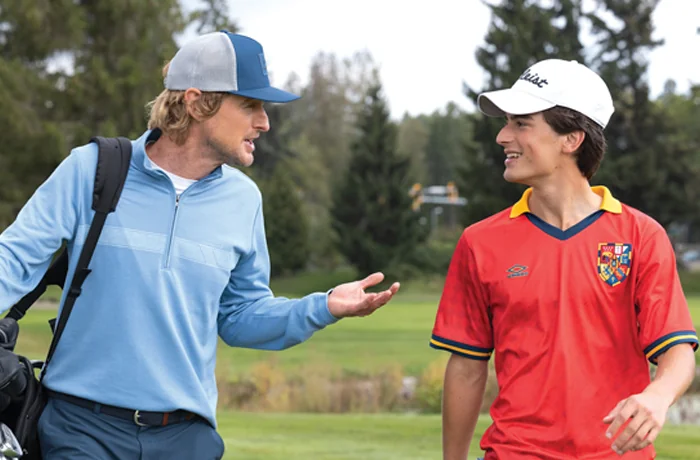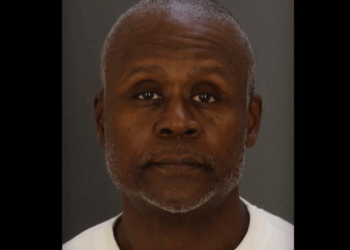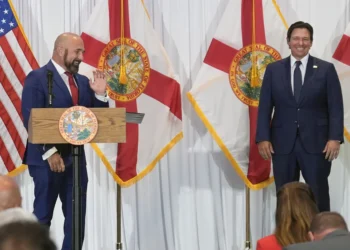If Apple TV+’s new series Stick were any more affirming of left-coded mental-health assumptions, we’d have to watch it on the American Psychiatric Association’s TV channel. Stick is for therapy bros, for trauma-mongers, for chicks who need trigger warnings on their trigger warnings.
The show stars a breathy Owen Wilson as Pryce Cahill, a former PGA professional who left golf after a “psychotic break” on a wicked par 4. Now a pro-shop salesman in the midst of a divorce, Pryce alternates between upselling weekend duffers and eating Lucky Charms straight out of the box. If, as the former champion swears to a customer, a golf course is a “cathedral,” then Pryce’s god is both capricious and difficult to disregard. One moment, our hero is finished with the sport in any but the humblest capacity. The next, he’s picked out tomorrow’s Tiger Woods and is hitting the amateur circuit as trainer, coach, and all-around fixer of his young pupil’s game.
The youngster in question, Santi Wheeler, is played by Peter Dager, a Hollywood newcomer as forgettably handsome as an AI fake. Like many under-20 protagonists these days, Santi is both hugely talented and as fragile as an already cracked egg. When viewers first meet the teenage prodigy, he is dinging golf balls off of yardage markers in the impossible distance, an ability that might naturally inspire gratitude and love. Yet Santi’s father enjoyed golf, himself. Before Santi can do likewise, he must come to terms with the fatherly unkindness that nearly made him put away his clubs for good.

So pervasive is this kind of narrative-making in today’s Hollywood that it hardly registers anymore as ideological. If golf makes Santi sad, conventional wisdom now has it, who cares if it might also make him famous and rich? The problem with such thinking, if I may say so bluntly, is that it is just utter bulls***, the sort of atrocious emotional-health humbug that makes one grope around for a weighted blanket to destroy. In real life, a young man of Santi’s ability would fuel himself on hatred if necessary but would find a way to make it work. That’s what talented poor people do.
Because Apple’s program must ultimately tell a dramatic story, it eventually gets there. More than a little worrying, however, is the writers’ assumption that audiences both want and will comprehend the various psychotherapeutic waystations that break the journey. And, my goodness, are there a lot of them. Exploring Pryce and Santi’s knotty relationship, Stick invokes “boundaries,” “mental-health timeouts,” and other preoccupations of the Wellness Left. Long conversations are had about “mindfulness” and other self-soothing behaviors. The father of a deceased son, Pryce lingers on syrupy sweet home videos, even as his friend and former caddy (Marc Maron) urges him to “process” his grief. When Santi finds a girlfriend (Lilli Kay), she wastes little time before lambasting “grind-culture rhetoric” and “late-stage capitalistic ideology.”
It hardly needs pointing out that these gestures are not funny. Nor do they align with reality, except in the sense that millions of people unthinkingly accept them. If one didn’t know better, one might conclude that Stick’s writers are in the pay of a professional counseling guild, so close is their embrace of the relevant lexicon and worldview. Why else include material that doesn’t get a laugh, provides no authentic depth, and is the very opposite of action?
The answer, of course, is that Stick was made for a certain kind of emotionally brittle left-winger. Like its closest cousin, Ted Lasso, the new series takes for granted the progressive cosmology and presents a world in which heroes strive and prevail within that framework. Not only are leftist fixations unchallenged, it doesn’t even occur to anyone to challenge them. Case in point: a scene in the fourth episode in which characters share, at perplexing length, their pronouns. The scene isn’t funny and isn’t meant to be. Nor does it advance the plot. It is simply wish fulfillment: a fleeting vision of what the world would look like if only the forces of reaction could somehow cease to exist.
Needless to say, Stick’s politics feel very weird in our actual cultural moment. Like Apple’s Murderbot, the streaming service’s golf “comedy” was written and filmed before the 2024 election and released after it. In the interim, wokeness was on the ballot and lost. The effect is of TV shows that feel marooned, like space aliens left behind by their departing fleet. It isn’t their fault they were made for a second Joe Biden term and got stuck in President Donald Trump’s. But neither is that fact easily overlooked.
THE NEUROTIC BREAKDOWN BEHIND APPLE’S NEW SCI-FI SHOW MURDERBOT
Of course, if Stick were a more inventive series, one might forgive it its antiquated ideas. Sadly, nearly every element of the show’s construction is secondhand. As Ted Lasso did, Stick puts its leading man through the marital wringer to gin up cheap emotional strain. Like every sports movie in history, the series trots out a pop-music-accompanied training montage when the plot begins to drag. Even Santi’s “teeing-off” sound effect owes a debt to Happy Gilmore, a far better and more memorable golf production. Forget its peculiar personality — Stick’s very bones are hollow inside.
Finally, there is the performance of Wilson as the show’s cloyingly optimistic lead. An actor of pronounced limitations, the 56-year-old hits the same saccharine note over and over, to quickly diminishing returns. Fans of interesting performances will not find Stick to be a safe space. Instead, the series is a warning light for creators who would strap the viewing public into the progressive-nostalgia machine. Yes, wokeness is largely behind us, but a hectoring, unfunny “trauma-dy” can still get canceled.
Graham Hillard is editor at the James G. Martin Center for Academic Renewal and a Washington Examiner magazine contributing writer.















